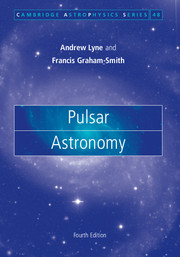Book contents
- Frontmatter
- Contents
- List of illustrations
- Preface
- 1 The discovery of pulsars
- 2 Neutron stars
- 3 Telescopes and techniques
- 4 The distances of the pulsars
- 5 Pulsar timing
- 6 Timing and astrometry of binary pulsars
- 7 Timing irregularities
- 8 The Galactic population of pulsars
- 9 The Crab and Vela Pulsars
- 10 Other young pulsars
- 11 Millisecond and binary pulsars
- 12 Accretion-powered X-ray pulsars
- 13 Magnetars
- 14 Supernovae and their remnants
- 15 Integrated pulse profiles
- 16 Individual pulses
- 17 Location of emitting regions
- 18 Radiation processes
- 19 The emission mechanisms
- 20 Interstellar scintillation and scattering
- 21 The interstellar magnetic field
- 22 Achievements and prospects
- References
- Index
5 Pulsar timing
Published online by Cambridge University Press: 05 March 2012
- Frontmatter
- Contents
- List of illustrations
- Preface
- 1 The discovery of pulsars
- 2 Neutron stars
- 3 Telescopes and techniques
- 4 The distances of the pulsars
- 5 Pulsar timing
- 6 Timing and astrometry of binary pulsars
- 7 Timing irregularities
- 8 The Galactic population of pulsars
- 9 The Crab and Vela Pulsars
- 10 Other young pulsars
- 11 Millisecond and binary pulsars
- 12 Accretion-powered X-ray pulsars
- 13 Magnetars
- 14 Supernovae and their remnants
- 15 Integrated pulse profiles
- 16 Individual pulses
- 17 Location of emitting regions
- 18 Radiation processes
- 19 The emission mechanisms
- 20 Interstellar scintillation and scattering
- 21 The interstellar magnetic field
- 22 Achievements and prospects
- References
- Index
Summary
Astrophysics provides many examples of rotating and orbiting bodies whose periods of rotation and revolution can be determined with great accuracy. Within the Solar System the orbital motion of the planets can be timed to a small fraction of a second, while the rotation of the Earth is used as a clock that is reliable to about one part in 108 per day. Outside the Earth there is, however, no other clock with a precision approaching that of pulsar rotation.
The arrival times of the radio pulses from pulsars are easy to study, and a surprising amount can be learned from them. Not only do they provide information on the nature of the pulsed radio source, they can also give an accurate position for the source; and they can explore the propagation of the pulses through the interstellar medium. All three kinds of information were noted by Hewish and his collaborators in the discovery paper of 1968. They showed that the shortness of the pulses, and their short and precise periodicity, implied that the source was small, and that it might be a rotating neutron star. They showed also that the pulse period was varying because of the Doppler effect of the Earth's motion round the Sun; this annual variation implied that the source lay outside the Solar System. Finally, they showed that the arrival time of a single pulse depended on radio frequency; this dispersion effect was found to be in accord with the effect of a long journey through the ionised gas of interstellar space.
Information
- Type
- Chapter
- Information
- Pulsar Astronomy , pp. 61 - 75Publisher: Cambridge University PressPrint publication year: 2012
